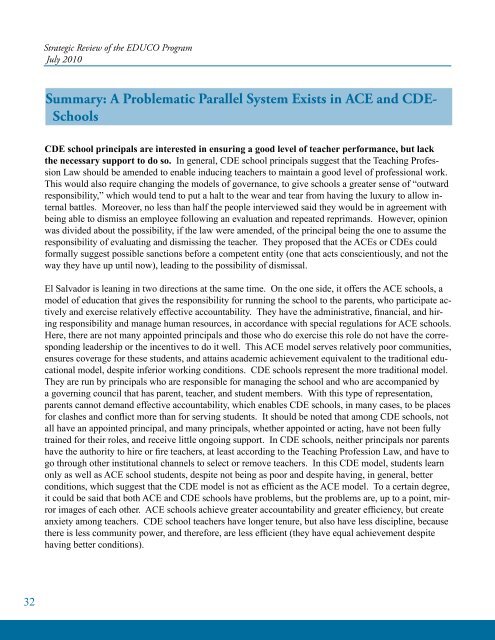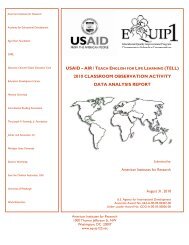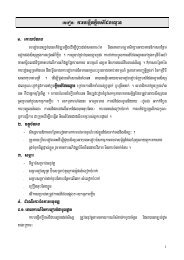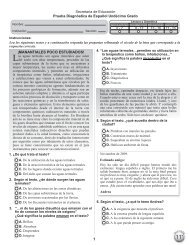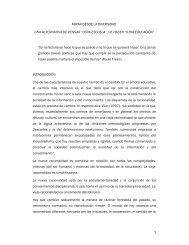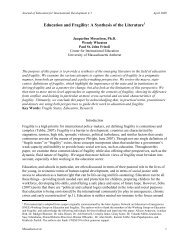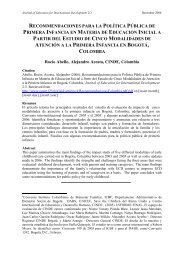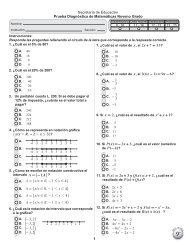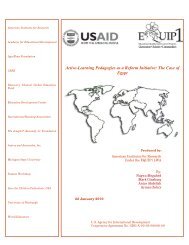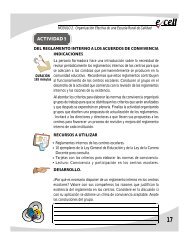Strategic Review of the EDUCO Program - EQUIP123.net
Strategic Review of the EDUCO Program - EQUIP123.net
Strategic Review of the EDUCO Program - EQUIP123.net
You also want an ePaper? Increase the reach of your titles
YUMPU automatically turns print PDFs into web optimized ePapers that Google loves.
<strong>Strategic</strong> <strong>Review</strong> <strong>of</strong> <strong>the</strong> <strong>EDUCO</strong> <strong>Program</strong>July 2010Summary: A Problematic Parallel System Exists in ACE and CDE-SchoolsCDE school principals are interested in ensuring a good level <strong>of</strong> teacher performance, but lack<strong>the</strong> necessary support to do so. In general, CDE school principals suggest that <strong>the</strong> Teaching Pr<strong>of</strong>essionLaw should be amended to enable inducing teachers to maintain a good level <strong>of</strong> pr<strong>of</strong>essional work.This would also require changing <strong>the</strong> models <strong>of</strong> governance, to give schools a greater sense <strong>of</strong> “outwardresponsibility,” which would tend to put a halt to <strong>the</strong> wear and tear from having <strong>the</strong> luxury to allow internalbattles. Moreover, no less than half <strong>the</strong> people interviewed said <strong>the</strong>y would be in agreement withbeing able to dismiss an employee following an evaluation and repeated reprimands. However, opinionwas divided about <strong>the</strong> possibility, if <strong>the</strong> law were amended, <strong>of</strong> <strong>the</strong> principal being <strong>the</strong> one to assume <strong>the</strong>responsibility <strong>of</strong> evaluating and dismissing <strong>the</strong> teacher. They proposed that <strong>the</strong> ACEs or CDEs couldformally suggest possible sanctions before a competent entity (one that acts conscientiously, and not <strong>the</strong>way <strong>the</strong>y have up until now), leading to <strong>the</strong> possibility <strong>of</strong> dismissal.El Salvador is leaning in two directions at <strong>the</strong> same time. On <strong>the</strong> one side, it <strong>of</strong>fers <strong>the</strong> ACE schools, amodel <strong>of</strong> education that gives <strong>the</strong> responsibility for running <strong>the</strong> school to <strong>the</strong> parents, who participate activelyand exercise relatively effective accountability. They have <strong>the</strong> administrative, financial, and hiringresponsibility and manage human resources, in accordance with special regulations for ACE schools.Here, <strong>the</strong>re are not many appointed principals and those who do exercise this role do not have <strong>the</strong> correspondingleadership or <strong>the</strong> incentives to do it well. This ACE model serves relatively poor communities,ensures coverage for <strong>the</strong>se students, and attains academic achievement equivalent to <strong>the</strong> traditional educationalmodel, despite inferior working conditions. CDE schools represent <strong>the</strong> more traditional model.They are run by principals who are responsible for managing <strong>the</strong> school and who are accompanied bya governing council that has parent, teacher, and student members. With this type <strong>of</strong> representation,parents cannot demand effective accountability, which enables CDE schools, in many cases, to be placesfor clashes and conflict more than for serving students. It should be noted that among CDE schools, notall have an appointed principal, and many principals, whe<strong>the</strong>r appointed or acting, have not been fullytrained for <strong>the</strong>ir roles, and receive little ongoing support. In CDE schools, nei<strong>the</strong>r principals nor parentshave <strong>the</strong> authority to hire or fire teachers, at least according to <strong>the</strong> Teaching Pr<strong>of</strong>ession Law, and have togo through o<strong>the</strong>r institutional channels to select or remove teachers. In this CDE model, students learnonly as well as ACE school students, despite not being as poor and despite having, in general, betterconditions, which suggest that <strong>the</strong> CDE model is not as efficient as <strong>the</strong> ACE model. To a certain degree,it could be said that both ACE and CDE schools have problems, but <strong>the</strong> problems are, up to a point, mirrorimages <strong>of</strong> each o<strong>the</strong>r. ACE schools achieve greater accountability and greater efficiency, but createanxiety among teachers. CDE school teachers have longer tenure, but also have less discipline, because<strong>the</strong>re is less community power, and <strong>the</strong>refore, are less efficient (<strong>the</strong>y have equal achievement despitehaving better conditions).32


